In the past two decades, the UK has experienced a steady flow of net migrants into the economy. The 2016 Brexit vote has led to a sharp fall in net EU migration, but to a large extent this has been offset by a rise in non-EU migration. This net migration has had a wide-ranging impact on the UK population, wages, productivity, economic growth and tax revenue. Does net migration benefit the UK economy?
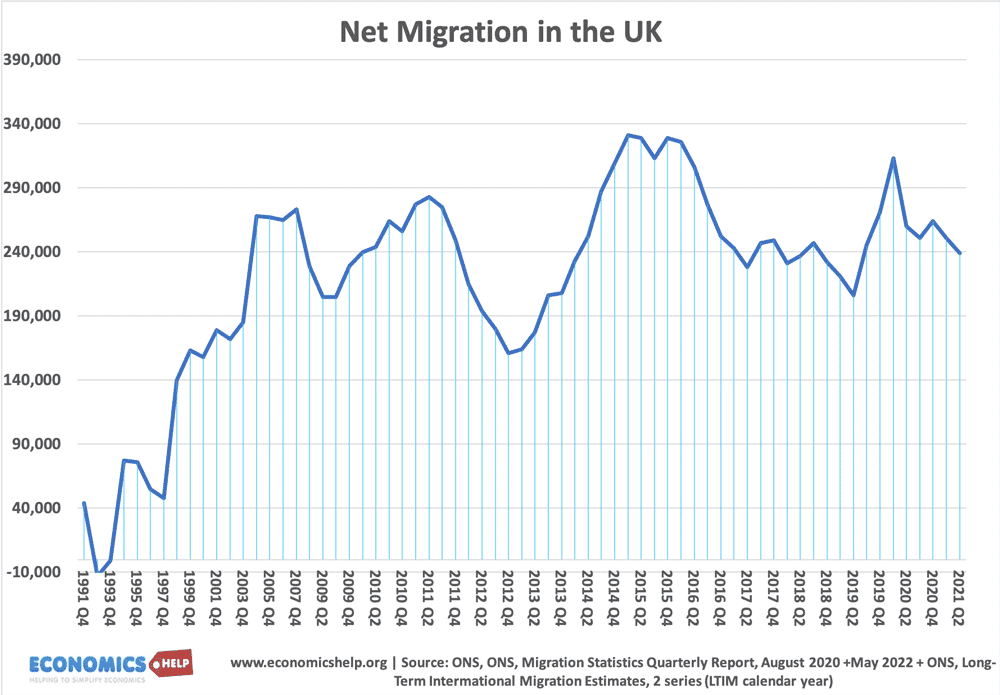
- In 2021, Net long-term international migration was estimated to be +238,000 in 2016.
- In 2021 Q4, there were 18.766 applications for asylum.
- In 2019, there were 9.5 million people born outside the UK (estimated 14% of the UK’s population.) (5.8 million, non-EU, 3.6 million EU)
Inflows and Outflows
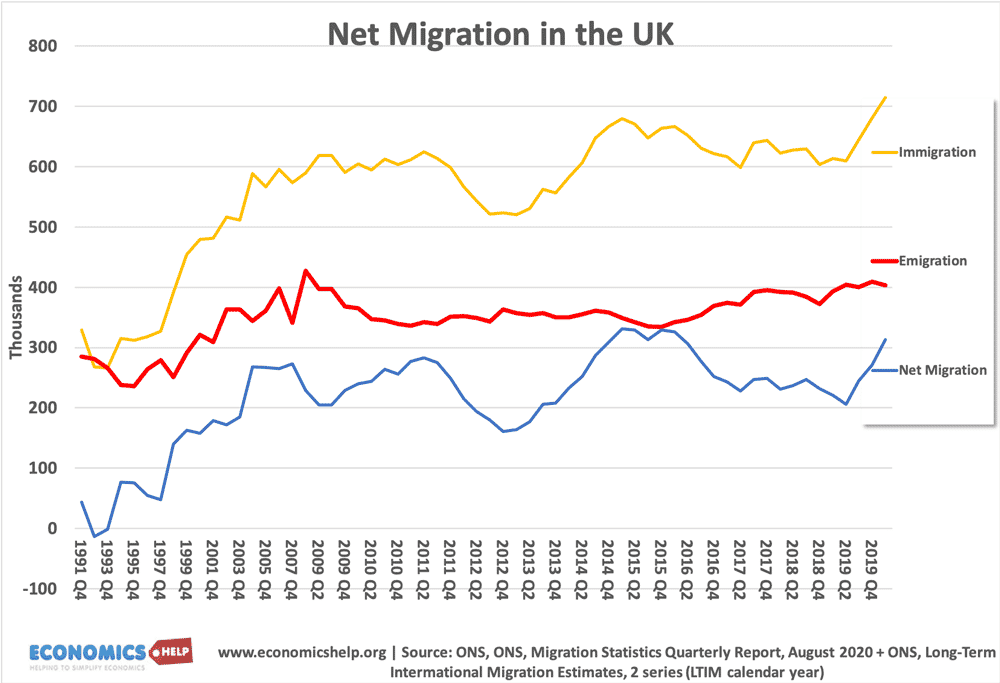
- In 2019, the top 6 countries for the source of migrants was India, Poland, Pakistan, Romania, Ireland.
EU vs Non-EU immigration
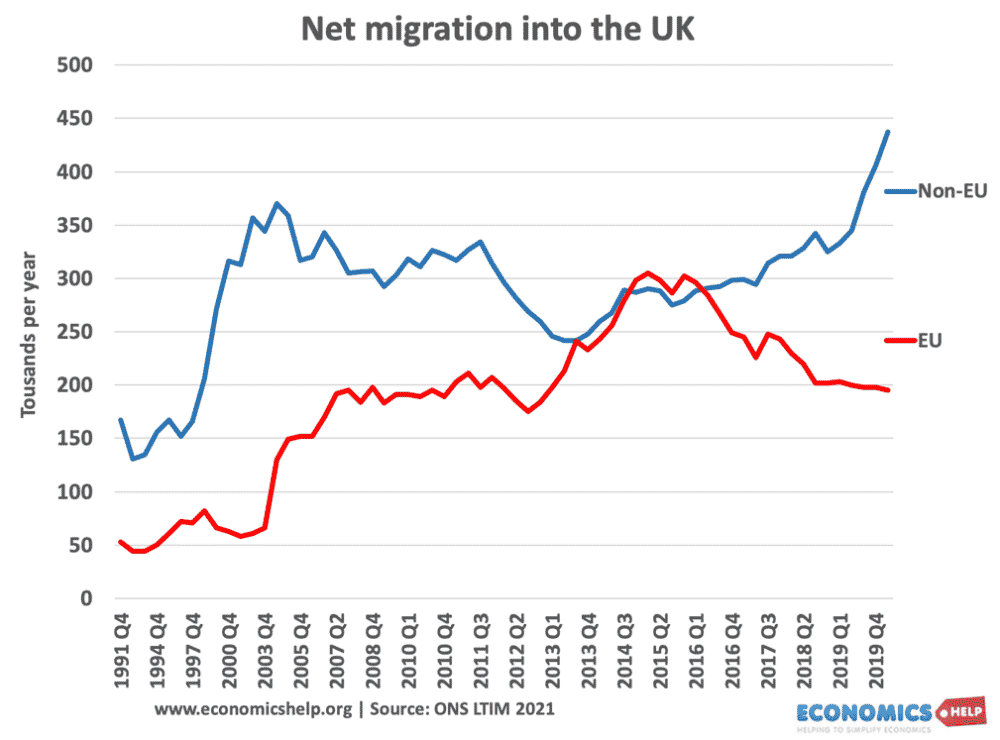
Traditionally non-EU immigrants are more likely to come for family reasons, whilst EU migration has been focused on work.
Impact of Net Immigration on UK Economy
1. Increase in Labour Force
Migrants are more likely to be of working age. The majority of migrants come for work or study (students) They may bring dependents, but generally net immigration leads to an increase in the labour force, a decline in the dependency ratio and increases the potential output capacity of the economy.
2. Increase in aggregate demand and Real GDP
Net inflows of people also lead to an increase in aggregate demand. Migrants will increase the total spending within the economy. As well as increasing the supply of labour, there will be an increase in the demand for labour – relating to the increased spending within the economy. Ceteris paribus, net migration should lead to an increase in real GDP. The impact on real GDP per capita is less certain.
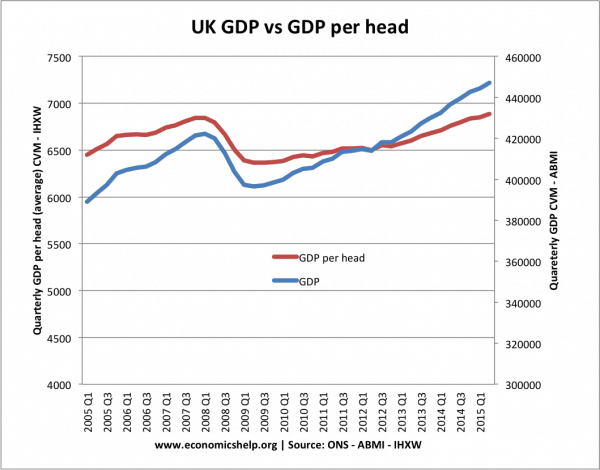
In fact, net migration can make economic growth look stronger than it is. In the period 2005-2015, UK real GDP has increased significantly faster than GDP per head. See GDP per capita for more info.
3. Labour Market Flexibility
Net migration could create a more flexible labour market. Migrants will be particularly attracted to move to the UK if they feel that there are job vacancies in particular areas. For example, during the mid-2000s, there was a large inflow of workers from Poland and other Eastern European economies – helping to meet the demand for semi-skilled jobs, such as builders and plumbers. The government has also sought to attract migrants from various countries to meet shortfalls in job vacancies in key public sector jobs, such as nursing.
- In theory, a period of higher unemployment might discourage migrants (this has occurred in the case of Ireland). However, the UK aw continued net migration despite higher unemployment 2008-12. Since 2012, unemployment has fallen considerably and migration has remained fairly constant.
4. Positive impact on the dependency ratio
With an ageing population, the UK is forecast to see an increase in the dependency ratio. However, net migration helps to reduce the dependency ratio. Migrants are more likely to be a source of working-age people, and this helps to reduce the ratio of retired to working people. The Migration Observatory reports, that in 2019, 70% of the foreign born were aged 26-64, compared to 48% of the UK born (link). This younger population has benefits for the government’s budget. If migrants are of working age, they will pay income tax, VAT – but will not be claiming benefits.
5. Impact on particular sectors

An important reason for net migration is higher education. In 2019/20, according to Higher Education Statistics Agency (HESA) there were 556,625 international students (link), studying in the UK. These students may not show up in long-term migration trends. But, the short-term effects are quite important. The London Economic analysis estimate that students of 2018-19 contributed a net £25.9 billion to the UK economy (link – pdf). A very significant contribution. These payments also help to finance higher education for domestic students.
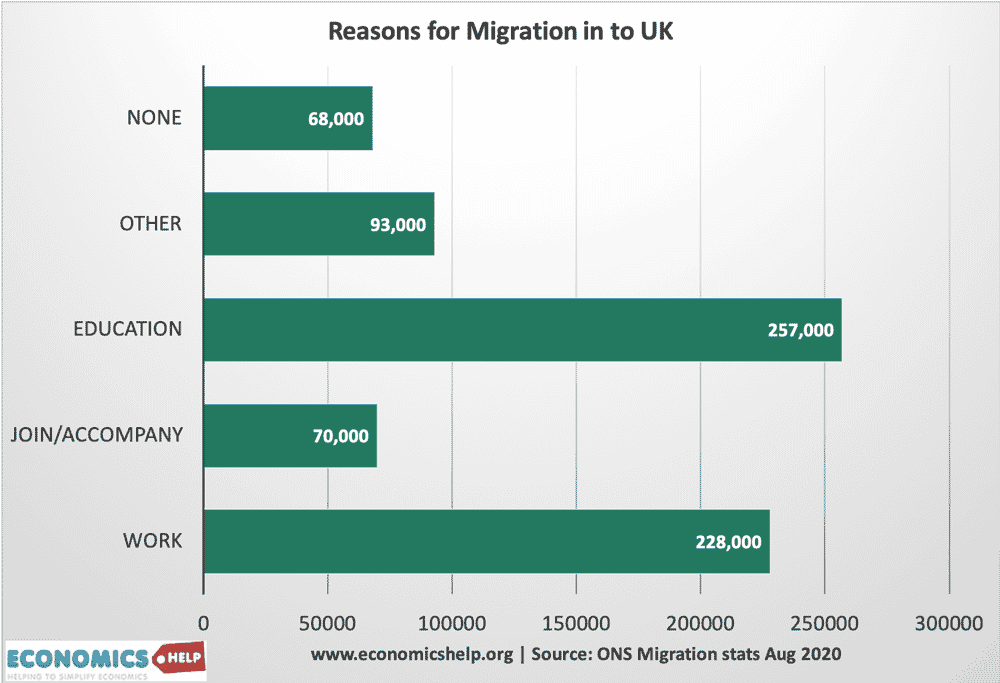
The latest ONS report suggests formal study is the biggest reason for net migration into the UK. See also: reasons for net migration into the UK
6. Social issues
Another issue felt keenly in the UK, is the concept that we are already ‘overcrowded’ In this case, a rapid increase in the population due to migration could lead to falling living standards. For example, the UK faces an acute housing shortage, but also an unwillingness to build on increasingly scarce green belt land. In many cities, it is difficult to build more roads because of limited space. The increased population could increase congestion and urban pollution. Therefore, the increase in real GDP has to be measured against these issues which affect the quality of life.
7. Economies of scale
Others may argue that concepts of ‘overcrowding’ are misplaced. In the nineteenth century, people were already worried about overcrowding. But higher population densities are in one sense more efficient and have a lower environmental impact. Other countries like Belgium have an even greater population density than the UK. Also, if migrants help to grow the economy, there will be more tax revenue to finance public infrastructure.
8. Welfare benefits
A popular idea is that immigrants are more likely to receive welfare benefits and social housing. The suggestion is that Britain’s generous welfare state provides an incentive for people to come from Eastern Europe and receive housing and welfare benefits. While immigrants can end up receiving benefits and social housing. A report by the University College of London, suggests that :
- However, despite the positive figures in the decade since the millennium, the study found that between 1995 and 2011, immigrants from non-EEA countries claimed more in benefits than they paid in taxes, mainly because they tended to have more children than native Britons.
In recent years, claiming unemployment benefits in the UK is quite strict – the claimant count measure of unemployment is much less than the labour force survey (see: Unemployment stats). People have to prove they are looking for work. Also, the criteria to be given an immigration visa from non-EU countries is increasingly strict. The migrant often have to show they have a degree of savings or an offer of a good job. The UCL report on immigration suggested that immigrants tend to be more highly skilled than native workers.
- In 2011, 32% of recent EEA immigrants and 43% of non-EEA immigrants had university degrees, compared with 21% of the British adult population.
Does Immigration Cause Unemployment?
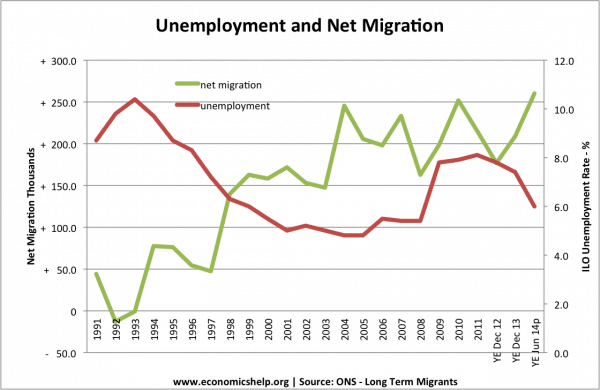
No clear link between migration and unemployment. Net migration occurred with falling unemployment 1991-2005, but rising unemployment from 2008-12. The fall in unemployment since 2012 may have attracted more migrants coming to work.
A common question people often ask – is whether immigration causes unemployment? Migrants have often been blamed for ‘taking our jobs’ – especially in periods of high unemployment, and in local areas of above-average unemployment.
Firstly, net migration is compatible with low unemployment. Net migration helped the US population to increase drastically around the turn of the century, but this didn’t cause unemployment. Migrants bring both an increased supply of labour and higher demand for labour. In the 1990s, net migration was consistent with falling unemployment in the UK.
However, in periods of high unemployment, it may be much more difficult for migrants to find work. This may be exacerbated if the migrants have poor English, low skills and or suffer racial discrimination. In this case, net migration could add to the unemployment problem. However, the underlying cause of unemployment is not net migration, but the recession.
Another factor that determines the impact on unemployment is the skills and qualifications of immigrants. If migrants have low skills, they are more likely to experience structural unemployment. In the 1950s, immigration into the UK from the Caribbean was encouraged for manual labour (driving buses e.t.c.) to fill job vacancies. However, when the period of full employment ends, migrants may be more liable to be unemployed, if they lack the skills to find new work.
The impact on unemployment in the current crisis depends on the type and skills of workers who are migrating into the UK.
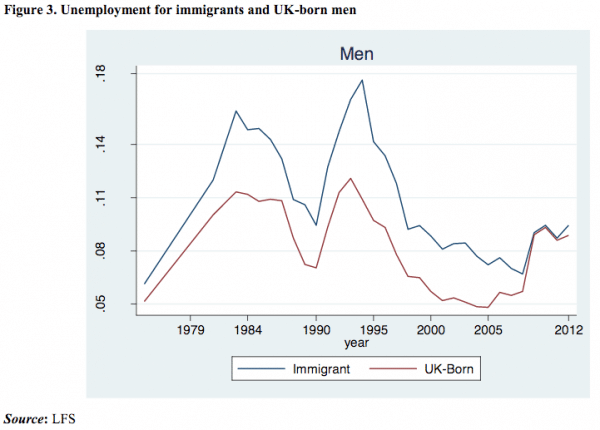
This shows that the unemployment rate for immigrants tends to be higher than for UK born workers. This gap is especially true during recessions. One reason put forward is that immigrants tend to be more likely to be working on short-term contracts, and so in a downturn are more likely to be laid off.
Does Immigration Push Down Wages?
From one perspective an increase in the labour supply may push down wages. This is especially true if migrants are keen to accept lower wages (e.g. willing to bypass traditional union bargaining). However, again, net migration doesn’t have to push down wages. The massive immigration into the US, during the twentieth century, was consistent with rising real wages. Increased migration, will also affect demand for labour due to higher spending in the economy. Immigration increases labour supply – but also increased labour demand.
However, particular labour markets may notice lower wages if there is a concentration of immigrants willing to work. For example, if wages are high in a particular agricultural market, migration from a low-income country may lead to falling wages in these specific markets.
Also, some migrants may be more vulnerable and more willing to work in the black market (e.g. accept a wage below the equilibrium).
Further reading: Lump of labour fallacy – the fallacy that increased labour supply always pushes down wages.
Bank of England study on wages and immigration
A Bank of England found a rise in immigration had a tiny impact on overall wages – with a 10% increase in immigration – wages fall by 0.31%. However, the negative effect was greater for semi/unskilled workers in the service sector, with a 10% rise in immigration reducing wages the equivalent of 2%. B of E report. However, this explains only a small fraction of the real wage decline since 2007.
Video on Immigration
Evaluation of Immigration
The impact of net immigration depends on:
- The skills and qualifications of migrants. The UK is increasingly strict on allowing only skilled workers.
- How easy do migrant find it to assimilate in the destined country? E.g. in the 1950s and 1960s, migrants from the Indian sub-continent / Caribbean may have found it more difficult to find employment due to poor English / racial discrimination.
- It depends on the age profile of migrants. If a high % are young workers, then this can help reduce the dependency ratio – a crucial issue for the government budget.
- It depends on the current economic climate. In a recession, migrants will find it harder to gain employment.
- It depends on the type and skills of migrants. Migrants from Eastern Europe may be more flexible and return home if the economic situation deteriorates. Low skilled migrants are more likely to be structurally unemployed.
- Migrants can be a source of foreign income, e.g. tuition fees from foreign students. However, migrants may also send a substantial portion of their earnings to relatives abroad – reducing the wealth of UK.
- Can the Economy absorb a greater population? For example, what are the impact on public services, levels of congestion, and housing?
Impact of Immigration on housing
Positive net migration levels are a significant factor in increasing the number of households in the UK. Given limited housing supply (and difficulties of increasing supply), this is putting upward pressure on UK house prices and the price of renting.
Related
- Reasons for net migration into the UK
- Immigration and the black market
- Flexible labour markets and immigration
- Long-term migrants data at ONS
NOTE: EEA – European Economic Area – EU, plus EFTA countries Norway, Iceland and Liechtenstein.

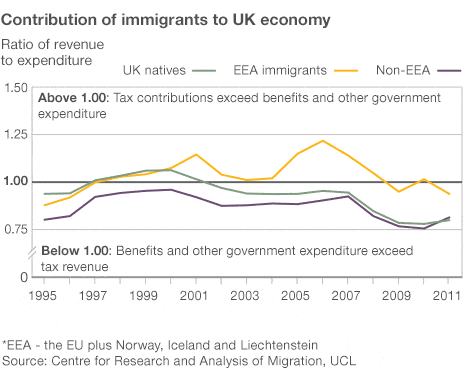
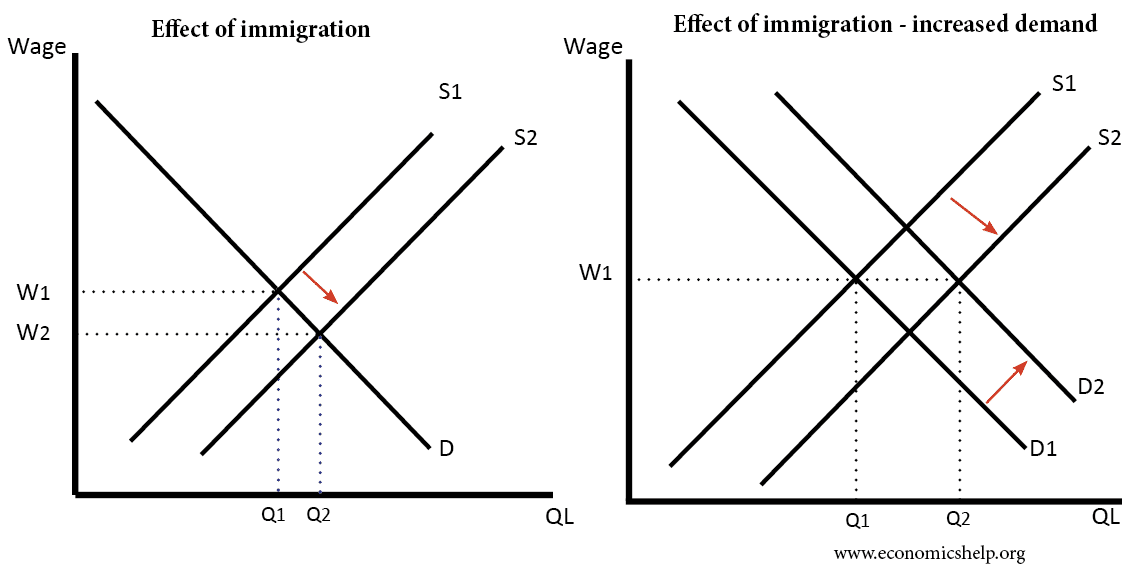
Un travail magnifique merci encore une fois
Thank you a lot for this web site
I like reading a post that can make people think.
You are using government figures for unemployment.
In reality, the unemployment figures are considerably higher. With more industry in the 70’s and early 80’s, we had 4 million unemployed. We now have far less industry and nearly twice the population and the government is trying to say we have less than 2 million unemployed now?
Unemployment figures should include those on back to work schemes as they have no permanent job, it is still debateable if they will be taken on at the end of their training and they are still being paid by the benefits system. It should also include those on other schemes and types of benefit that the government often use to juggle the unemployment figures. The REAL figures for unemployment would frighten the hell out of everyone.
for Sharing such an amazing article
On the subject of migration pushing down wages, see the Wages Phillips Curve: https://www.bankofengland.co.uk/inflation-report/2019/august-2019/supply-and-the-labour-market – actual data for the UK shows that supply has an evident effect on wages.
“The tightness of the labour market has been associated with faster pay growth.”
Your analysis fails to analyse the fact that high immigration has been occurring for 25 years. It has not supplied a “fix” for static real wages.
We now have a demographic set by high migration, adding young families at the bottom will not change our current population pyramid, we have been doing this for 25 years so the pyramid already includes migration.
Time to be honest? Overpopulating the UK with 500,000 new people (migrants+new children of migrants) annually will just lead us to disaster and for what? Low pay for hospitality, NHS, care and agricultural workers? The UK can only feed 40-50m people from its own resources, if population grows to 70m + and climate change continues the British will not just lose their countryside, they might lose their lives.
Please don’t lie about migration. It just increases the population, not real wages. It is no good for British people, it only benefits business owners.
So why British people do not take up their British jobs so you can have 0 immigration? There is 1.22m unemployed in Uk with over 35m job vacancies.
Because work doesn’t pay and we were importing people from poor countries with lower expectations and accept lower living standards that means a race to the bottom. Zero hour contracts, room sharing, in work benefits etc
Immigration directly increases potential economic output by increasing the labor force size. Immigrants also help to increase productivity. In fact, immigrants contribute to economic growth by filling labor shortages, purchasing goods, and paying taxes. Productivity rises when more people work. Furthermore, as an increasing number of Americans retire in the coming years, immigrants will help fill labor demand while also preserving the social safety net. In the fiscal year ending June 2021, India was the most common country of birth for migrants in the UK (896,000). After a number of Polish-born people left the UK, it reclaimed first place from Poland. Poles remained the largest non-British nationality (696,000).
Immigrants often live in groups in areas of the larger towns in the UK such as Brixton, the East end area of London and towns like Bradford and this is deemed acceptable and understandable by the Media and Politicians. What peeves me is that if an indigenous native of these shores expresses a desire to live in an area with their own race and culture they are shouted down and accused as a racist. Surely if this group is racist so are the prior mentioned groups can anyone from the media or any politician explain this conundrum for me?
Thank you for your suggestion Preeti, we will try to explain in a more specific way on our future articles. beautiful article
Thank you for creating this blog. I am hoping this will be well-known to everyone so that it could help a lot. good article
thank you very nice website article. nice topic
I appreciate encouraging posts like this. I think we all need a little encouragement, some days.thank you
Thank you for this help full artical.continu
Your posts are very instructive, which I later learned a lot from this article . thank you for this .